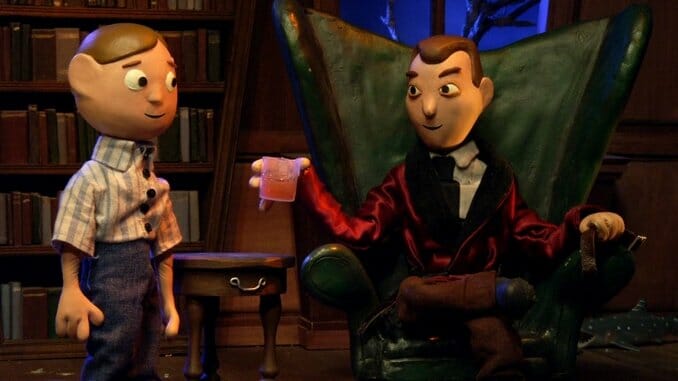Moral Orel‘s Unfathomable Bleakness Makes It the Perfect Show for 2020
Images courtesy of Adult Swim
It has become kind of a joke that in terms of television there is depressing, and then there is Moral Orel depressing. There is no good time to rewatch the show, which aired on Adult Swim between 2005 and 2008, with a prequel in 2011, but 2020 is certainly an appropriate time to do so. Moral Orel has been available to stream for quite some time, but the program’s only physical media release in the United States came in 2007, featuring Season 1 and part of Season 2. For the longest time, this left only the Australians who got the rest of the series on DVD, and self-flagellating Americans who intentionally sought it out, to wallow in the show’s bleakness as a whole. Now that it is available on HBO Max, America can finally return to a world of human hypocrisy in the name of religious observance and willful ignorance. Hurray!
Dino Stamatopoulos’ series deliberately uses the stop-motion clay aesthetic of Davey and Goliath, which was first produced in the 1960s by the Evangelical Lutheran Church in America, to misdirect the viewer into thinking this is merely a parody of modern evangelicalism, before really bringing the hammer down in later episodes. Each episode is 11 or 12 minutes long, and is still heavily padded by the intro and credits. Even at that length, Moral Orel is less a Fun Size candy bar than a highly-concentrated bitter pill. The main character, Orel Puppington (as voiced by Carolyn Lawrence, who also voices Sandy Cheeks in SpongeBob SquarePants) is a pre-teen Job in the town of Moralton, who keeps his faith in his father Clay (Scott Adsit) and mother Bloberta (Britta Phillips) in spite of infidelity, toxic masculinity, and forced ignorance and asceticism as their only escape.
Season 1 Moral Orel pokes fun of Orel’s naivete and Moralton’s hypocrisy in a “sin of the week” format, akin to Leave It To Beaver and other early situation comedies. Plots about reanimating the dead, impregnating the town’s population, and selling urine as a sports drink are almost trivial when compared to the deeper issues involving the cast of characters, while season 2 adds even more depth into the sad, sad lives of Moralton’s townspeople, who would rather destroy a puppy than acknowledge its positive impact, or who only reject Satanism because in practice it’s basically a sadder version of the buffet at Plato’s Retreat. The Encyclopedia Brown homage “Elemental Orel” is really pertinent to these times, if you consider the act Orel catches his parents doing at the end, and how Jerry Falwell, Jr.’s career in evangelicalism has ended in recent weeks.
-

-

-

-

-

-

-

-

-

-

-

-

-

-

-

-

-

-

-

-

-

-

-

-

-

-

-

-

-

-

-

-

-

-

-

-

-

-

-

-








































